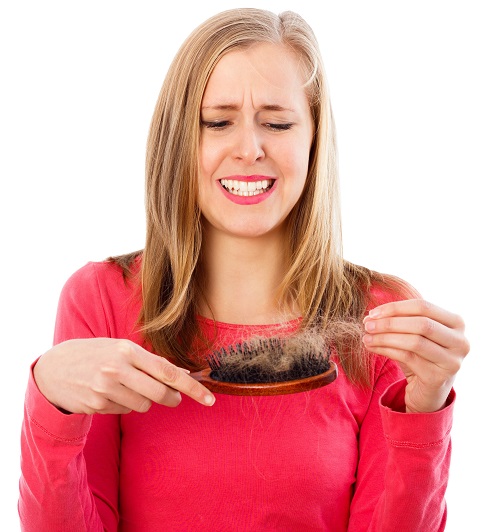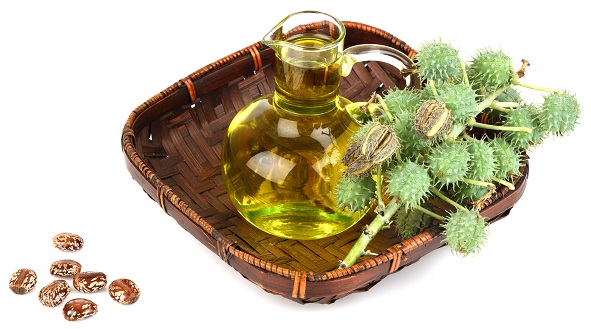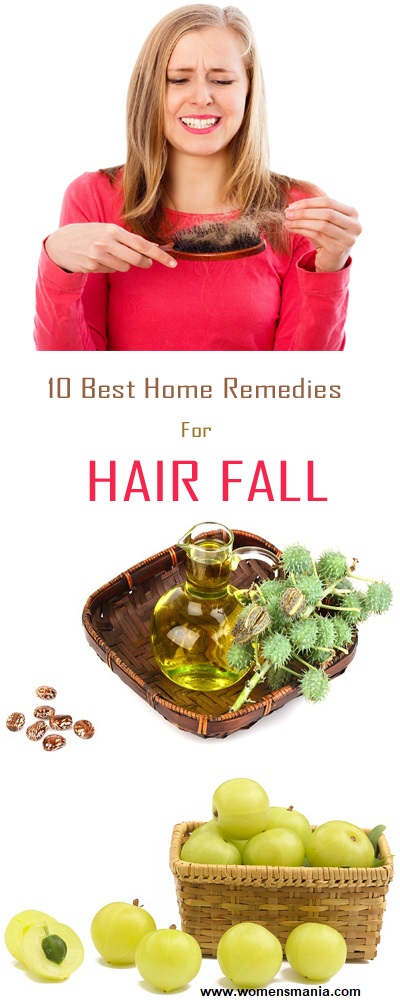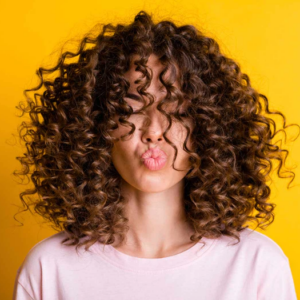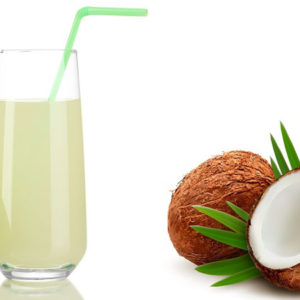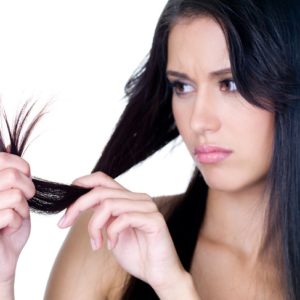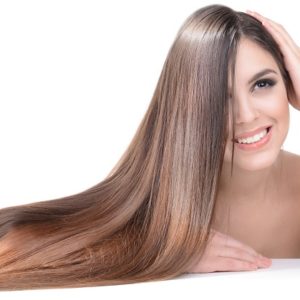Is hair loss giving you nightmares? Are you looking for a treatment for hair fall prevention that works without chemical or medicine side effects? These home remedies should be tried. According to hair experts, it is quite reasonable to lose 50–100 hair strands every day. If however, you lose more than that, it is a cause of concern, but with these simple home remedies, you can stop hair fall. Here are the 10 simple and best home remedies for hair fall.
How To Prevent Hair Fall – Some Amazing Tips!!
It’s a natural phenomenon; so there’s no need to worry about losing some hair. There may be many causes of hair loss including diet, deficiency in minerals, medicines, stress, pollution, and genetics. Here is our list of tips to help with hair loss reduction or treatment.
1. Get the Diagnosis Done Right: Find the most prominent areas of thinning and monitor how much hair you lose whenever you comb or shampoo. Consult a doctor to see if you have any underlying medical problem that can cause hair loss.
2. Choose Hair Products Carefully: Try switching to sulfate-free, silicone-free shampoos to prevent loading your scalp and hair with harsh chemicals that cause damage, making your hair brittle and easy to break.
3. Maintain a Healthy Scalp: If you have problems such as dandruff or an oily/dry scalp, you must immediately address these issues. Scalp health is vital to the growth of healthy hair and to preventing hair loss.
4. Use the Perfect Comb: Use a wide-tooth wooden comb to untangle your hair; after this, you can use your regular brush to reduce breakage and hair loss from pulling.
5. Have a Protein Diet: Eating lean meats, fish, soy or other proteins help to reduce hair fall.
6. Air-Dry the Right Way: Using a towel to dry your hair vigorously will cause hair breakage, tangles and pulling. Instead, with your towel, gently squeeze out your hair’s excess moisture and let it dry naturally.
7. Wash Your Hair: Regular hair washing is part of hair loss prevention by keeping hair and scalp clean. Wash your hair with a gentle hair cleanser or shampoo at least once every 3 days to clean and get rid of the accumulated dirt, dust, oil, and build-up of bacteria. Keep it clean to avoid hair falling from clogged follicles at all times.
8. Use Proper Styling Methods: Do not subject your hair to frequent chemical treatments, excessive blow-drying, ironing, and colouring since it can lead to hair loss. If you have coloured your hair and faced hair loss problems, it will be a good thing to take a short break before putting some more chemicals in your hair. Avoid daily hairstyles such as tight ponytails, pigtails, or braids. Using hair elastics to pull hair back tightly can cause hair loss.
9. Stress: Stress and hair loss go hand in hand, so find ways to relax through yoga, which happens to be a good stress buster.
10. Genetics: It is said that people with AR genes, which are inherited suffer from hair loss ending up with stunted hair growth or even permanent hair loss.
Effective & Best Home Remedies For Hair Fall Control:
Doesn’t your heartbreak into pieces when you see your precious hair all over the floor and on your comb? The same routine continues every day, which increases an individual’s stress and anxiety. Hair fall is a serious problem, and a proper diagnosis is needed to identify the cause and work for it to cure. The best thing is that hair fall can be stopped by using safe and effective natural home remedies. Thinking about how to stop hair falling immediately? Here are our 10 simple and natural home remedies for hair fall:
1. Spinach and Lettuce Juice:
In your daily diet, we recommend this. Spinach is rich in fatty acids such as vitamins K, A, C, B2, B6, B1, E, manganese, zinc, iron and omega-3. These nutrients help your scalp and hair to be nourished, ensuring healthy hair growth. The high spinach antioxidant content helps to prevent hair damage and boosts the health of the scalp. Lettuce’s unique vitamin and mineral composition cure any vitamin and mineral deficiencies in the body, often the most common cause of hair loss. Another common cause of hair loss is digestive problems, and lettuce can promote better digestive health, which helps to limit any hair loss caused by intestinal problems. The zinc in lettuce promotes hair growth as well as health.
How To Do It:
- Most active are half-cooked and boiled spinach and lettuce. Make a spinach and lettuce smoothie and drink it for best results twice a day.
Result Time:
- Within 15 days of regularly taking in the spinach and lettuce smoothie, you will find that your hair fall rate has dropped considerably.
2. Coconut:
Coconut is by far the best for hair loss treatment. We can either use coconut milk or oil for hair fall control. The use of coconut milk or even coconut oil on your hair prevents breakage due to dryness regularly. They also have antibacterial properties that prevent hair damage. You can either make it at home by grating coconut and squeezing some milk out, or use store-bought coconut oil. Coconut milk is one of Vitamin E’s most abundant sources. It keeps your hair healthy and effectively moisturizes it. It is also plentiful in potassium, which is extremely important to foster good hair growth.
How To Do It:
- Massage your scalp with a generous amount of coconut milk. Work your way up to your hair’s tip. Then immerse a towel in hot water and squeeze out the extra water. Wrap this towel on your head and leave for approximately 20 minutes. Rinse off your hair with cold water and then use a mild shampoo to follow. Repeat this remedy once a week for noticeable results.
- Alternatively, you can heat some coconut oil and use your fingertips to massage your scalp slowly. It increases blood flow to hair follicles, improves the strength of your hair’s roots and conditions your scalp. Do this every other day until the results are seen.
Result Time:
- Within a week the hair fall will get in control.
3. Fenugreek:
Methi or fenugreek seeds are a good source of protein and nicotinic acid that helps to treat different types of hair issues such as hair dryness, baldness and hair thinning and works as an excellent hair fall solution. It contains large amounts of lecithin that hydrates the hair and strengthens the follicles of the roots or hair.
How To Do It:
- Soak the seeds of fenugreek overnight in water. To make a paste, grind the seeds in the morning and add two tablespoons of yoghurt. Apply it starting from the root to the tips of your hair and cover with a shower cap. Leave on for approximately 30 minutes and rinse with cold water. This can be applied once or twice a month.
Result Time:
- You will experience the change with just one application.
4. Egg Mask:
Eggs are one of the best hair fall remedies which are a rich protein source, B vitamins and essential nutrients required for optimal hair health.
How To Do It:
- What you need is 2 eggs (or) 1 tsp. of olive oil and 1 egg.
- Break open in a bowl the 2 eggs. Separate the yolk from the egg white. Mix the egg white thoroughly until a thick; even consistency is obtained. Apply the egg white to your hair and scalp using a hair dye brush. Cover your head and leave it on for about 20 minutes with a shower cap. Then later rinse with cold water and a mild shampoo.
- Take 1 egg white and whisk it, add a teaspoon of olive oil. Beat and mix to make it into a paste. Apply it all over the hair and scalp. Leave it for about 20 minutes. Rinse with cold water and mild shampoo.
Result Time:
- Twice a week, repeat the remedy and see your hair fall getting under control in just 15 days.
5. Indian Gooseberry (Amla):
Amla is loaded with vitamin C which has several hair advantages. Amla promotes collagen production that enhances hair growth. Also, to absorb iron, vitamin C is also essential. This keeps the roots ‘ hair strong. Vitamin C also prevents your hair from greying prematurely.
How To Do It:
- Method 1- Hair oil of Amla. In coconut oil, boil some dried gooseberries until the oil turns black. Then take the heat off and let it cool down. Massage your hair and scalp with this oil. Leave it for about 20 minutes and wash off with mild shampoo. Repeat this twice a week. If dried amla is unavailable, you can also mix amla oil with coconut oil.
- Method 2 – Amla Hair Pack. Grate the fruits of amla and extract the juice. Mix this juice with 2 teaspoons of the same portion of lime juice. Apply this to your scalp and leave it to dry. Then rinse with warm, plain water.
- This can be followed twice a week.
Result Time:
- Within a week the hair fall rate will reduce considerably.
6. Green Tea:
Green tea is known to boost the production of hair follicles and hair. It also increases your metabolism, which was associated with an increase in hair growth rate.
How To Do It:
- Steep in hot water the 2 green tea bags and wait for the water to cool down. Now remove the tea bags and rinse your hair with the solution. Massage your scalp with the solution.
- As an after-shampoo conditioner, you can use this green tea solution. After shampooing your hair, repeat the procedure twice a week.
Result Time:
- Within a month of using the green tea solution your hair fall will normalize.
7. Licorice:
Licorice is a powerful herb that remedies many problems with hair and scalp. Dandruff and dry flakes are eliminated, thus opening the pores and soothing irritation.
How To Do It:
- The root should be soaked in milk overnight, and then ground into a thick paste that is then applied directly to the hair loss areas on the scalp. It is recommended that the paste is left in place overnight for maximum efficacy before rinsing. Apply licorice paste twice a month for best results.
Result Time:
- Within a month your hair fall will reduce and come to normalcy.
8. Henna:
Henna is widely used in Asian countries as a significant source of hair reinforcement. Henna can change the colour of your hair over time. Henna is used as a hair mask by many people.
How To Do It:
- Mix henna in curd to make a hair mask. Whip it well and apply it evenly to the scalp and loose hair strands. Allow it to settle for an hour on the hair. Use a mild shampoo to wash with hot/cold water. Use the hair mask at least once a month.
- We can also use henna in the form of a leaf. Try this easy hair pack as a natural hair loss remedy. Boil 60 gm. of henna leaves in 250 ml of mustard oil until all leaves burn entirely. Then filter the oil and store the oil in an airtight jar with the help of the muslin cloth. Use this oil daily to see good results.
- To get a good result, try henna mixed with beetroot juice. It is one of the most potent hair fall home remedies.
- Henna is one of the best hair loss remedies, especially for those who like colouring their hair.
Result Time:
- Within 15 days of regular use, hair fall will drop considerably.
9. Greek Yogurt:
Greek yoghurt is a natural hair conditioner. It contains vitamin B5 and highly beneficial hair proteins. Honey has antibacterial properties that protect hair against damage. Greek yoghurt contains probiotics that make hair grow according to studies.
How To Do It:
- Take 2tablespoons of Greek yoghurt in a bowl. Add honey and lemon juice from the lemon to this. Mix the contents thoroughly and make a paste. Apply this pack to the scalp and roots of your hair using a hair dye brush.
- Leave it for about 30 minutes and rinse thoroughly with cold water. This pack must be used once a week. But you can use the pack twice a week if you’ve got dry hair.
Result Time:
- Within a couple of weeks, you can see your hair fall rate normalize.
10. Castor Oil:
It’s an old, traditional scalp and hair care method. Using castor oil as a hair mask is best because it has a thick consistency. Better to mix with coconut oil and olive oil in a half-and-half-ratio. This will facilitate the distribution of the mask throughout your hair. Castor oil has antimicrobial properties and has a high content of vitamin E, proteins and minerals that prevent hair loss.
How To Do It:
- Mix some drops of castor oil with other oils and massage onto the scalp. It must not be used more than once a week.
One of the most painful things in the world is dealing with hair loss. Just sitting around and watching your hair wither away is hard. So, don’t do that! With all the new technologies and ancient natural remedies, it has become much easier to deal with hair loss than it used to be. You too can fight hair loss with this handy guide and emerge victoriously. Do you know, any other natural home remedies for hair fall? Leave a comment below to share it with us.
Disclaimer:
All these natural home remedies for hair fall control, described above are assembled from the experiences of people around the world and have hardly any side effects. Since each type of scalp and hair is different, please test the remedy on a small area before applying it to the entire portion of the scalp surface. If there is some reaction or irritation, please stop using it and consult your doctor.
Frequently Asked Questions:
Question 1: How much hair fall is regular?
Answer 1: Unlike popular belief, hair fall is quite a normal phenomenon, where you lose up to 50 to 100 hair strands every day. It’s when you start losing more than you need to worry about it. Hair fall is backed by hair growth when it occurs in its natural course, but if the hair loss rate exceeds the natural hair regrowth frequency, it is a cause of concern. You should consult a trichologist immediately if you lose hair in tufts and are unable to maintain volume. Hair loss can lead to baldness, known as alopecia technically. It is characterized by the head and body loss of hair. With the latest technological advances, hair loss can be controlled and largely reversed. There are some traditional home remedies for hair growth that work to address this problem.
Question 2: What are the reasons for hair fall?
Answer 2: Many factors cause hair loss. Causes of hair loss include the following:
- Stress
- Hereditary causes
- Hormonal imbalance
- Unhealthy food
- Harsh chemical treatments
- Psoriasis
- Protein deficiency
- Iron deficiency or anaemia.
- Emotional trauma
- Poor hair hygiene
- Thyroid related disorders
Question 3: What are the signs and symptoms of hair loss?
Answer 3: Depending on what causes it, hair loss can appear in many different ways. It can suddenly or gradually come on and only affect your scalp or your entire body. Some hair loss types are temporary, while others are permanent. Signs and symptoms of hair loss might include:
- On top of the head, gradual thinning: This is a prevalent type of hair loss that affects both men and women as they age. In men, hair often begins to recede in a line similar to the letter M from the forehead. Typically, women retain the hairline on their foreheads but have an expanded part in their hair.
- Bald spots that are circular or patchy: Some people experience bald spots that are smooth and coin-sized. This type of hair loss usually only affects the scalp, but in beards or eyebrows it sometimes also occurs. In some cases, before the hair falls out, your skin may become itchy or painful.
- Sudden loss of hair: A physical or emotional shock may result in hair loss when washing or combing your hair, or even after gentle tugging, dozens of hair can come out. Usually, this type of hair loss causes hair thinning overall and not bald patches.
- Loss of full-body hair: Some conditions and medical treatments may result in hair loss throughout your body, such as cancer chemotherapy. Usually, the hair is growing back.
- Scaling patches that spread across the scalp: This is a ringworm sign. It may go hand in hand with broken hair, redness, swelling, and sometimes oozing.
Question 4: Is it possible to cure hair loss?
Answer 4: There are effective treatments available for certain types of hair loss. You may be able to reverse hair loss or further thinning at least slowly. With conditions like patchy hair loss (alopecia areata), hair may regenerate within a year without treatment. Hair loss treatments include home remedies, medicines, hair growth surgery and slow hair loss.
Question 5: What are the different hair loss treatments?
Answer 5: There is a range of different hair loss treatments which are as below:
- Medication: If an underlying disease causes your hair loss, it will be necessary to treat this disease. This may include drugs to reduce inflammation, such as prednisone, and to suppress your immune system. If some medication causes hair loss, your doctor may advise you to stop using it for at least 3 months. Drugs are available to treat baldness (hereditary) patterns. Options include Minoxidil (Rogaine), Finasteride (Propecia) and other drugs.
- The operation for hair transplantation: Hair transplantation for loss of hereditary hair. The top of the head is only affected in the most common type of permanent hair loss. Hair transplantation, or surgery for restoration, can make the most of your left hair.
- Laser therapy: As a treatment for hereditary hair loss in men and women, the Food and Drug Administration has approved a low-level laser device. Some small studies have depicted that hair density improves. To demonstrate long-term effects, more studies are needed.
Question 6: Can blow-drying cause hair fall?
Answer 6: Blow drying, which is associated with hair/scalp dryness, can damage the hair. Hot air exposure can dry the moisture and cause root damage. Avoid using the dryer in high heat mode. Limit hair dryer use to a maximum of twice a week.
Question 7: How to reverse hair loss?
Answer 7: You can take the following steps to reverse hair loss:
- To help your hair grow, relax and decrease stress.
- Talk to a dermatologist and be realistic about your hair loss approach.
- Explore your treatment options for hair loss.
- Consider using new products for hair care.

